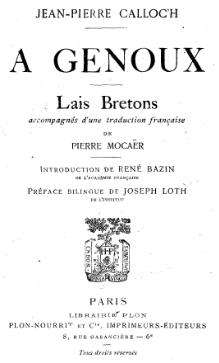Yann-Ber Kalloc'h

Yann-Ber Kalloc'h (born Jean-Pierre Calloc'h in French) (21 July 1888 – 10 April 1917) was a French writer in Breton and French. He died in combat in World War I, near Urvillers/Cerizy (Aisne).
The Breton Scouting organization Bleimor is named in his honor.
Life
Yann-Ber Kalloc'h was born on the island of Groix as the son of a fisherman (who died in October 1902) and his wife. He describes his childhood in the autobiographical poem I was born in the middle of the sea. Kalloc'h at first wanted to become a Roman Catholic priest and entered the minor seminary of St Anne d'Auray in 1900, then the major seminary at Vannes in October 1905. He was forced to renounce his vocation after his two sisters and his younger brother revealed signs of mental illness, since canon law forbade the priesthood to those who had relatives suffering from such diseases. He became tutor in various cities including Paris. Taking the bardic name of Bard Bleimor (Sea Bass), Kalloc'h wrote for various regionalist and autonomist newspapers in the Breton language.
On October 12, 1915, he wrote a letter to Achille Collin which became the basis for a 1919 petition in favor of Breton.
In Brittany, at least six streets bear his name.[1]
Yann-Ber Kalloc'h enlisted in the French Army during World War I and was killed in action; his name appears in the Panthéon with those of 546 other writers who were killed in the war.
Writings
The literary work which reveals him to be one of the greatest Breton authors is a posthumous collection of poems often mystical, as in Ar deulin (Kneeling, War daoulin year in KLT) published by his friend Pierre Mocaer in 1925. This collection includes the famous poem Me 'zo Ganet kreiz ar e mor (I was born in the middle of the sea).
In these poems composed in large part to the front, he expresses his deep Roman Catholic faith, love of his native language and feelings in favor of Breton political autonomy.
Works
|
|
|
References
- ↑ The names that have made the history of Brittany, 1997
- Tim Cross (1989) The Lost Voices of World War I: an international anthology of writers, poets and playwrights. Iowa City: University of Iowa Press ISBN 0-7475-0276-5
External links
| Wikisource has original text related to this article: |
| Wikimedia Commons has media related to Jean-Pierre Calloc'h. |